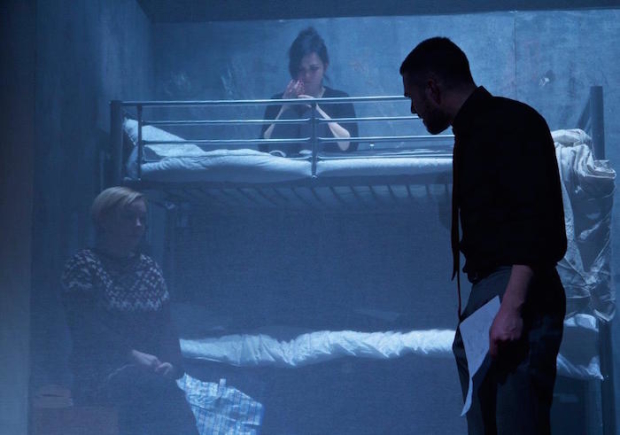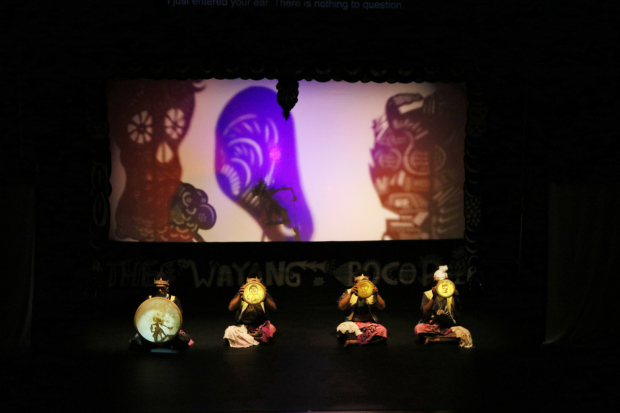Under the Radar 2017: Time of Women and God Bliss (In the Name of Semelah)

(© Georgie Weedon)
By David Gordon
A fraudulent presidential election allegedly takes place. Protests ensue. Three outspoken women are arrested for their activism by the government. No, this is not a fictional projection by a liberal playwright of what could transpire in the United States of America after the election of Donald Trump. This actually happened to a trio of activists in Belarus several years ago. And that's what makes Time of Women, a new production of Belarus Free Theatre at this year's Under the Radar Festival, so scary.
Belarus Free Theatre was founded in 2005 by a group of artists protesting the censorship of freedom of expression in their home country. In the ensuing years, married company cofounders Nicolai Khalezin and Natalia Kaliada (who wrote Time of Women) became political refugees in Great Britain, unable to return to their home country. Khalezin directed the piece by collaborating with his Minsk-based actors via Skype (as he has in the past). Creating guerrilla theater underground, the company's work is vital and thrilling, giving voices to the otherwise voiceless. Time of Women, first performed in a Minsk apartment in 2014, is perhaps its most imperative to date.
This trio of prisoners is made up of Iryna Khalip, a PEN Pinter Prize-winning journalist, Natalya Radina, the editor of the independent human rights news organization Charter 97, and Nasta Palazhanka, a political activist. As Time of Women begins, they're getting ready for a Christmas party. One is drying her hair, another is baking a cake. But as they remember the events that led them to this cramped apartment, they're transported into a darkened room where their fates are in the hands of an angry government official.
Time of Women portrays these women with sensitivity and depth. Their determination, and how they refuse to give up their fight for a democratic Belarus, is particularly inspiring in an age where American-born activism is steadily on the rise. As performed by Maryia Sazonava (Iryna), Maryna Yurevich (Natalya), Yana Rusakevich (Nasta), the piece is terrifyingly real, with Kiryl Kanstantsinau adding intensity as the investigator who holds their futures in his hands. The production, staged by Khalezin, is suitably claustrophobic.
Like the best experimental theater, and particularly the best creations of Belarus Free Theater, Time of Women expertly blurs the lines between art and reality in ways that leave the audience shaken. It's an astonishing, important experience to see their work live. Long may they be able to create.

(© Ellen Wallop)
God Bliss (In the Name of Semelah)
By Zachary Stewart
Indonesia's culture, history, and politics are rarely discussed in North America, despite it being the fourth-largest country on Earth in terms of population (right behind the United States). This is more than enough reason to catch the Javanese company Wayang Bocor, which is now making its U.S. debut at the Asia Society with God Bliss (In the Name of Semelah).
It tells the story of Sunan Kalijaga, one of the "nine saints" who brought Islam to Indonesia. He begins his life as Sahid, a Javanese Robin Hood who robs from the rich to give to the poor. But an encounter with a Muslim holy man convinces him that there are more peaceful ways to combat injustice. Sahid's journey is contrasted with the warriors of Demak, who attempt to spread Islam through the sword. In the era of ISIS and al-Qaeda, this is a story that seems more relevant than ever.
The show is the creation of multidisciplinary artist Eko Nugroho, who incorporates his unique visual style into live performance and traditional Javanese shadow-puppetry: Behind a shadow screen, giant floating heads with tentacles occupy a dreamscape that looks like a live-action version of a terrifying graphic novel. In front of it, soldiers with spiky prismatic helmets and eyeball creatures move across the stage like a fashion show directed by Lady Gaga. It is beautiful and fascinating to behold.
All of this is set to Ishari Sahida's heart-pounding music: As the drums beat, we imagine an army of thousands on the march, even though the cast numbers no more than seven (because so much of the show is presented through mask and shadow, it is impossible to know who is playing what).
As impressive as these segments are, they often go on a bit too long, adding little to the plot after the first minute. The same can be said for the comic relief, which is drawn out long after it ceases to be funny. The show lasts 70 minutes, but the amount of story it conveys could probably be covered in under 30.
Still, it seems clear that story is just a pretext for Nugroho's real talent, which is creating another world that feels simultaneously alien and spiritually familiar.












